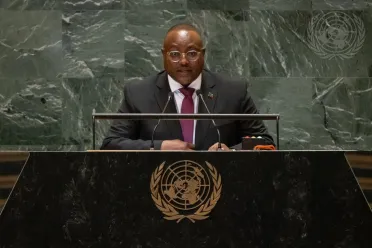Statement
Statement summary
MULAMBO HAMAKUNI HAIMBE, Minister for Foreign Affairs and International Cooperation of Zambia, said that multilateralism is the only viable approach to solving regional and international challenges, adding: “The creation of the United Nations 80 years ago provided new hope.” Like many other developing countries, Zambia is predominantly import-dependent, he noted, observing that the impact of conflicts in some parts of the world — resulting in disruptions, soaring prices and increased cost of living — did not spare it. In 2023 and 2024, his Government held the Chair of the Southern African Development Community (SADC) Organ on Politics, Defence and Security Cooperation. While the security and political situation in the region remains stable, he highlighted “pockets of security challenges” in the eastern parts of the Democratic Republic of the Congo and Cabo Delgado Province in Mozambique and called on States to support peacebuilding.
In 2024, Zambia experienced the worst drought in recent years that adversely affected agriculture and energy and slowed down the country’s economic growth, he reported, adding: “This year, about 50 per cent of Zambia’s population was at risk of food insecurity.” Noting that developing countries face a risk of debt distress, he underscored the need for an effective debt-workout mechanism that supports payment suspensions, longer lending terms and lower interest rates. He also called for further reforms to streamline the existing Group of Twenty (G20) Framework for Debt Restructuring in enhancing certainty and reducing the time it takes to conclude the process. Aggressive tax avoidance and evasion have a corrosive effect on financial integrity and he called for conclusion of negotiations on the UN Framework Convention on International Tax Cooperation. He also underscored the need for international cooperation to support developing countries in integrating technology. The Global Digital Compact is designed to close the digital gap, he added.
To reap the demographic dividend, Zambia has been investing in youth, that currently stands at 82 per cent below the age of 35. With its President being the African Union Champion on ending child marriage, his country’s campaign to end child marriage by 2030 “is growing from strength to strength”. Committed to promoting human rights, Zambia is a candidate to the UN Human Rights Council for 2026-2028. Turning to the Security Council reform, he said: “The time has come for the Security Council to be representative, democratic and accountable to all Member States, irrespective of status.” Since Africa constitutes the second largest bloc of the UN’s membership, proposals to reform the Council should heed Africa’s call as presented in the Common Africa Position and enshrined in the Ezulwini Consensus and the Sirte Declaration.
Full statement
Read the full statement, in PDF format.
Photo

Previous sessions
Access the statements from previous sessions.
